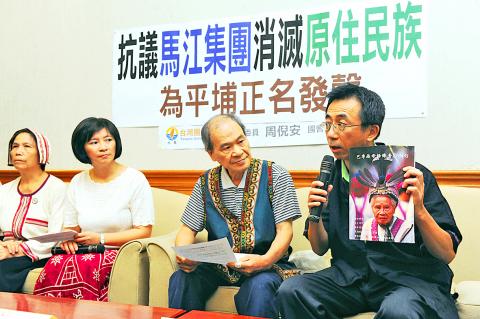Pingpu Aboriginal activists yesterday demanded that the government immediately grant official recognition to Pingpu tribes, saying that their aim is not to take a share of already scarce state resources allotted to Aboriginal matters, but to be recognized as Aborigines.
“We Pingpu Aboriginal tribes have our own cultures and languages. There’s no reason for the Council of Indigenous Peoples to refuse to grant us official recognition as Aborigines,” Taiwan Association for Rights Advancement for Pingpu Plains Aboriginal Peoples chairman Jason Pan (潘紀揚) of the Pazeh people told a news conference at the legislature yesterday.
Pan said the council has previously expressed concern that if granted recognition, Pingpu Aborigines may take too many resources from the other officially recognized Aboriginal groups, but stressed that “this is not the point.”

Photo: Lo Pei-der, Taipei Times
“We don’t mean to take a share of the resources; we just want to be recognized for who we are,” he said.
Pan said that despite the council’s repeated promises to grant them official recognition, first made more than six years ago, nothing has been done so far.
Kaxabu Aborigine Pan Pao-feng (潘寶鳳) said the Kaxabu language is closely related to the language of the Saisiyat and the Atayal, which are both officially recognized Aboriginal communities.
“Linguistic studies show that the Kaxabus are part of the Austronesian family in Taiwan. It makes no sense that while Saisiyats and Atayals are recognized, we are not,” Pan Pao-feng said.
“The Kaxabu language has been classified by UNESCO as an endangered language; the language and culture may eventually become extinct without an official status,” Pan Pao-feng said.
The Pingpus are Aborigines who traditionally lived in the lowland areas of Taiwan.
Advocates say that their cultures and languages have been severely threatened through their close and frequent interaction with Han people, warning that many tribes having already lost their identities, while others, including the Siraya, Pazeh, Kaxabu and Ketagalan, are struggling to gain official status as Aborigines.
The council did not directly address the call for official recognition, but it issued a press statement defending the administrative practice to separate “Aborigines” and “Pingpus” as a historic one, since it has been in place since the Qing Dynasty.
It said that despite not granting Pingpus official recognition, the council has put a lot of effort into protecting and preserving their cultures and languages.

CHAOS: Iranians took to the streets playing celebratory music after reports of Khamenei’s death on Saturday, while mourners also gathered in Tehran yesterday Iranian Supreme Leader Ayatollah Ali Khamenei was killed in a major attack on Iran launched by Israel and the US, throwing the future of the Islamic republic into doubt and raising the risk of regional instability. Iranian state television and the state-run IRNA news agency announced the 86-year-old’s death early yesterday. US President Donald Trump said it gave Iranians their “greatest chance” to “take back” their country. The announcements came after a joint US and Israeli aerial bombardment that targeted Iranian military and governmental sites. Trump said the “heavy and pinpoint bombing” would continue through the week or as long

TRUST: The KMT said it respected the US’ timing and considerations, and hoped it would continue to honor its commitments to helping Taiwan bolster its defenses and deterrence US President Donald Trump is delaying a multibillion-dollar arms sale to Taiwan to ensure his visit to Beijing is successful, a New York Times report said. The weapons sales package has stalled in the US Department of State, the report said, citing US officials it did not identify. The White House has told agencies not to push forward ahead of Trump’s meeting with Chinese President Xi Jinping (習近平), it said. The two last month held a phone call to discuss trade and geopolitical flashpoints ahead of the summit. Xi raised the Taiwan issue and urged the US to handle arms sales to

BIG SPENDERS: Foreign investors bought the most Taiwan equities since 2005, signaling confidence that an AI boom would continue to benefit chipmakers Taiwan Semiconductor Manufacturing Co’s (TSMC, 台積電) market capitalization swelled to US$2 trillion for the first time following a 4.25 percent rally in its American depositary receipts (ADR) overnight, putting the world’s biggest contract chipmaker sixth on the list of the world’s biggest companies by market capitalization, just behind Amazon.com Inc. The site CompaniesMarketcap.com ranked TSMC ahead of Saudi Aramco and Meta Platforms Inc. The Taiwanese company’s ADRs on Tuesday surged to US$385.75 on the New York Stock Exchange, as strong demand for artificial intelligence (AI) applications led to chip supply constraints and boost revenue growth to record-breaking levels. Each TSMC ADR represents

State-run CPC Corp, Taiwan (CPC, 台灣中油) yesterday said that it had confirmed on Saturday night with its liquefied natural gas (LNG) and crude oil suppliers that shipments are proceeding as scheduled and that domestic supplies remain unaffected. The CPC yesterday announced the gasoline and diesel prices will rise by NT$0.2 and NT$0.4 per liter, respectively, starting Monday, citing Middle East tensions and blizzards in the eastern United States. CPC also iterated it has been reducing the proportion of crude oil imports from the Middle East and diversifying its supply sources in the past few years in response to geopolitical risks, expanding